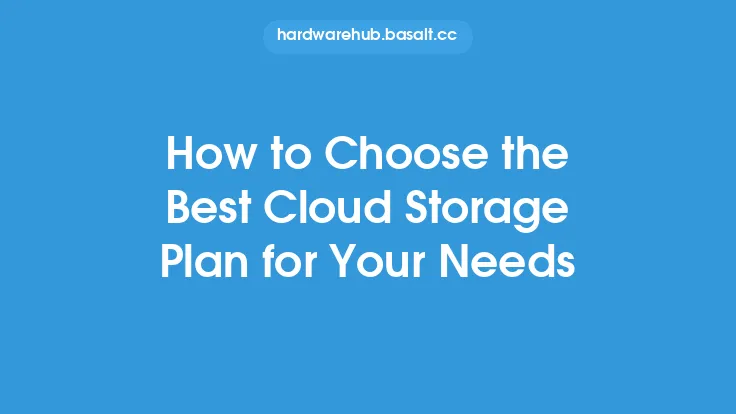When it comes to choosing the best support plan for your computer hardware, there are several factors to consider. A good support plan can provide peace of mind, minimize downtime, and ensure that your hardware is running at optimal levels. In this article, we will explore the key considerations for selecting a support plan that meets your needs.
Understanding Your Hardware Needs
Before selecting a support plan, it's essential to understand your hardware needs. This includes the type of hardware you have, its age, and its usage. For example, if you have a critical server that requires 24/7 uptime, you may need a more comprehensive support plan that includes priority support and on-site maintenance. On the other hand, if you have a desktop computer that is used for basic tasks, a standard support plan may be sufficient.
Types of Support Plans
There are several types of support plans available, each with its own set of features and benefits. These include:
- Standard support plans: These plans typically include phone and email support, as well as access to online resources and documentation.
- Premium support plans: These plans offer additional features such as priority support, on-site maintenance, and dedicated support engineers.
- Custom support plans: These plans are tailored to meet the specific needs of your organization and can include a range of features and services.
- Third-party support plans: These plans are offered by companies that specialize in providing support for hardware from multiple manufacturers.
Key Features to Consider
When selecting a support plan, there are several key features to consider. These include:
- Response time: How quickly will the support team respond to your issues?
- Resolution time: How quickly will the support team resolve your issues?
- Support hours: What are the support hours, and are they available 24/7?
- Support channels: What support channels are available, such as phone, email, and online chat?
- On-site support: Is on-site support available, and if so, what are the response times?
- Remote support: Is remote support available, and if so, what are the capabilities?
Support Plan Costs
The cost of a support plan can vary widely, depending on the features and services included. When evaluating the cost of a support plan, consider the following factors:
- The cost of downtime: How much will it cost your organization if your hardware is down for an extended period?
- The cost of replacement: How much will it cost to replace your hardware if it fails?
- The cost of maintenance: How much will it cost to maintain your hardware, including the cost of parts and labor?
- The cost of support: What is the cost of the support plan, and what features and services are included?
Manufacturer vs. Third-Party Support
When selecting a support plan, you may need to decide between a manufacturer-provided support plan and a third-party support plan. Manufacturer-provided support plans are typically more expensive, but they offer the advantage of direct access to the manufacturer's expertise and resources. Third-party support plans, on the other hand, can be more cost-effective, but they may not offer the same level of expertise and resources.
Evaluating Support Plan Providers
When evaluating support plan providers, consider the following factors:
- Reputation: What is the provider's reputation in the industry, and what do their customers say about their services?
- Experience: How much experience does the provider have in supporting your type of hardware?
- Expertise: What is the level of expertise of the provider's support engineers, and are they certified by the manufacturer?
- Resources: What resources does the provider have available to support your hardware, including spare parts and specialized equipment?
Conclusion
Choosing the best support plan for your computer hardware requires careful consideration of several factors, including your hardware needs, the type of support plan, key features, costs, and the provider's reputation and expertise. By taking the time to evaluate your options and select a support plan that meets your needs, you can minimize downtime, ensure optimal performance, and extend the lifespan of your hardware. Whether you choose a manufacturer-provided support plan or a third-party support plan, the key is to find a plan that provides the right level of support and resources to meet your specific needs.





